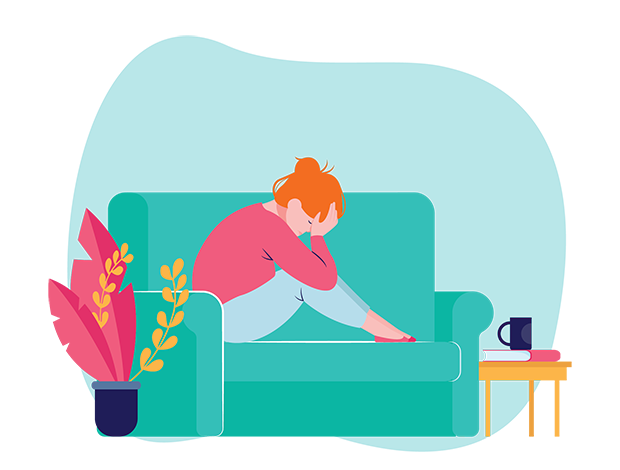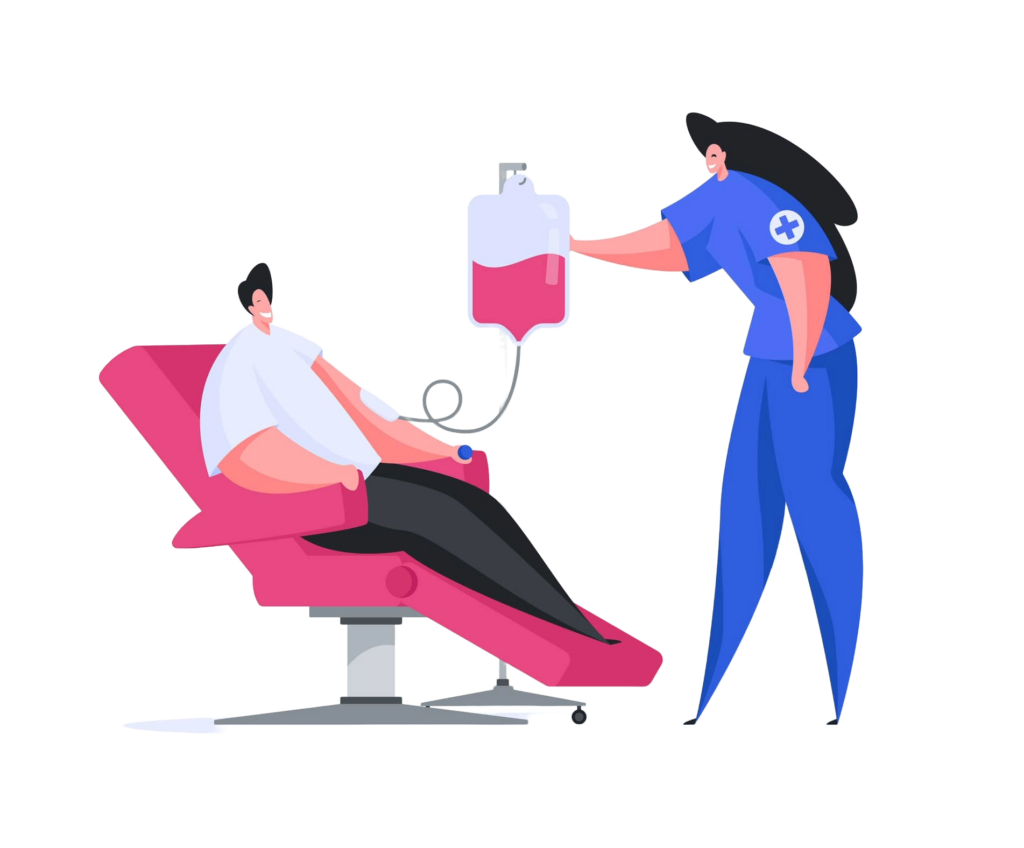Ketamine for Anxiety
Anxiety disorders are typically treated with a combination of prescription medication and therapy. In the past, the medication component of treatment for anxiety usually involved antidepressants or benzodiazepines. Today, many people whose mental health symptoms had not responded to these options are benefitting from ketamine for anxiety.

What Is Anxiety?
To fully appreciate the potential benefits of ketamine for anxiety, it is important to first understand what anxiety is.
In a mental health context, anxiety is an umbrella term that can refer to several distinct disorders, including:
- Generalized anxiety disorder (GAD)
- Social anxiety disorder (social phobia)
- Agoraphobia
- Specific phobia
- Panic disorder
- Separation anxiety disorder
The common characteristics of these disorders are overwhelming worry and excessive fear. The primary differentiator among the various types of anxiety disorders is what person, object, event, or circumstances prompts the onset of symptoms.
One of the reasons why research into ketamine for anxiety may yield such significant results is that anxiety disorders are among the most common types of mental illness in the United States. For example, the National Institute of Mental Health (NIMH) has provided the following data about the prevalence of anxiety disorders among U.S. adults:
- Experts estimate that about 19.1% of adults in the U.S. (or more than 49 million people aged 18 or above) had an anxiety disorder in the past 12 months.
- The past-year prevalence of anxiety disorders among adult women is 23.4%. Among adult men, it is 14.3%.
- The lifetime prevalence of anxiety disorders among U.S. adults is 31.1%. This means that three of every 10 adults in the U.S. will be affected by anxiety symptoms at some point.
Among the many types of anxiety disorders, specific phobia is the most common. The NIMH has reported that that 9.1% of adults in the U.S. (including 12.2% of women and 5.8% of men) had symptoms of specific phobia in the previous 12 months.

Common Symptoms of Anxiety Disorders
As noted in the previous section, all anxiety disorders are characterized by an overabundance of fear, worry, and related emotions. In addition to being disproportionate to any actual threat, these feelings can be so distressing that they impair a person’s ability to function at work, in school, or in other important areas of life.
Depending on which type of anxiety disorder a person has, they may exhibit symptoms such as the following:
- Developing shortness of breath, excessive perspiration, racing heart rate, lightheadedness, a sense of being smothered or choked, and other painful physical symptoms that do not have a medical or biological cause
- Changing their behaviors to avoid people, objects, or circumstances that could trigger the onset of symptoms
- An unwillingness to meet new people, give presentations, take public transportation, or participate in other events such as travelling or even leaving the house
- A persistent feeling of being in danger, which can manifest both physically (via muscle tension and an exaggerated startle response) and psychological (through an inability to focus or concentrate due to fear of imminent harm)
The good news about anxiety disorder symptoms is that they can typically be alleviated or managed via medication and therapy. The next few sections will focus on one of the more promising new approaches for treating these types of disorders: ketamine for anxiety.
What Is Ketamine?
Ketamine is a drug that is classified as a dissociative anesthetic. Its ability to numb pain and promote short-term amnesia has made it a valuable medication. Both medical doctors and veterinarians have used ketamine as a general anesthesia prior to certain procedures.
Ketamine’s ability to elicit effects such as hallucinations and dissociation has also made it an enticing substance of abuse for people who are seeking a certain type of recreational high. Ketamine is often grouped with MDMA (ecstasy or molly), Rohypnol, and GHB in the informal category of club drugs.
Research on ketamine’s potential mental health benefits began in the 1960s, but concerns about the drug’s negative side effects put an end to this effort. It wasn’t until the early 2000s that researchers resumed their investigations into ketamine as a mental health medication.
This recent research phase initially focused on ketamine’s ability to help people who were suffering from treatment-resistant depression. Through the years, experts have explored other applications for this drug, such as using ketamine for anxiety.
How Does Ketamine Help Anxiety?
Multiple studies – including two that were documented in a January 2018 article in the journal Neuropsychopharmacology and a September 2022 report in the Journal of Clinical Psychiatry – have found that the careful use of ketamine in a supervised clinical environment can have a positive effect on people who have anxiety disorders.
The 2018 article addressed ketamine’s benefits for patients who have social anxiety disorder, while the 2022 report noted that ketamine can alleviate symptoms of GAD. Both of these studies involved the use of ketamine infusions, which will be addressed in the next section.
Experts believe that the effectiveness of ketamine for anxiety is due at least in part to how the drug impacts the body’s production and distribution of glutamate. Glutamate is a neurotransmitter (or chemical messenger) that is associated with many processes and emotions, including stress and fear.
Ketamine has also been linked with enhancing certain neural pathways and helping the body create new synapses, both of which improve how neurons communicate throughout the central nervous system.
What Happens During a Ketamine Session?
In clinical settings, ketamine is typically administered in one of two ways: either as a nasal spray or via injection. The injection version of ketamine for anxiety and other mental health disorders is often referred to as ketamine infusion therapy. At Atlanta Integrative Psychiatry we utilize the nasal spray Spravato treatment as our form of ketamine therapy.
Ketamine as a Nasal Spray
In 2019, the U.S. Food and Drug Administration (FDA) approved a nasal spray medication called Spravato. This medication contains esketamine, which is a version of ketamine. The parameters of the FDA’s approval included a requirement that patients take Spravato only in a doctor’s office or clinic. This means that patients cannot receive a prescription for take-home Spravato.
If you are prescribed this medication, you will administer it yourself while under the supervision of your doctor or another qualified healthcare provider. You will most likely also have your blood pressure taken both before and after you administer the esketamine.
You will usually need to remain in the doctor’s office or clinic for an hour or two after you take the esketamine to make sure you don’t have any negative effects. The dosage level of esketamine nasal spray usually isn’t strong enough to sedate you, so you should remain awake throughout the session.
Ketamine Infusion Therapy
During a ketamine infusion therapy session, you will recline in a comfortable chair or bed. The professional who is providing the infusion will insert a small needle into one of the veins in one of your arms. Throughout the process, your vital signs will be monitored to ensure you don’t have any negative effects from the medication.
The infusion can last from 30-60 minutes. After the infusion is finished, you will usually be required to remain for another hour for observation.

Benefits of Ketamine for Anxiety
The following are examples of the many benefits of receiving ketamine for anxiety at Atlanta Integrative Psychiatry:
- You will be in a safe and comfortable environment.
- You will receive personalized attention from skilled professionals.
- You will be encouraged to ask questions, express concerns, and otherwise collaborate with the members of your treatment team.
- Ketamine therapy will be one part of a comprehensive treatment plan.
- You can receive care for co-occurring mental health concerns.
- You can experience relief from symptoms.
- You can learn how to better manage symptoms that are not alleviated by ketamine or other medications.
- You can share support with others who are working toward a similar goal.
Also, before you transition out of our care, we will provide you with a discharge plan to guide your continued progress.
Find Ketamine Treatment for Anxiety in Atlanta
If you believe that you can benefit from ketamine for anxiety, Atlanta Integrative Psychiatry may be the ideal place for you. We are a trusted provider of customized outpatient care for adults who have been living with anxiety disorders and a variety of other mental health concerns. Our team can assess the full scope of your needs and then develop a plan to help you acheive improved health.
To learn more about ketamine for anxiety or any other aspect of our programming – or to schedule a free assessment – please visit our appointment page or call our center today.
Find Mental Health Treatment Today
Atlanta Integrative Psychiatry is an Industry leader in mental health treatment . Our team of top medical experts specialize in dual diagnosis treat and are committed to ensuring that each patient is treated as an individual.
Call us today, we're avialable 24/7.




